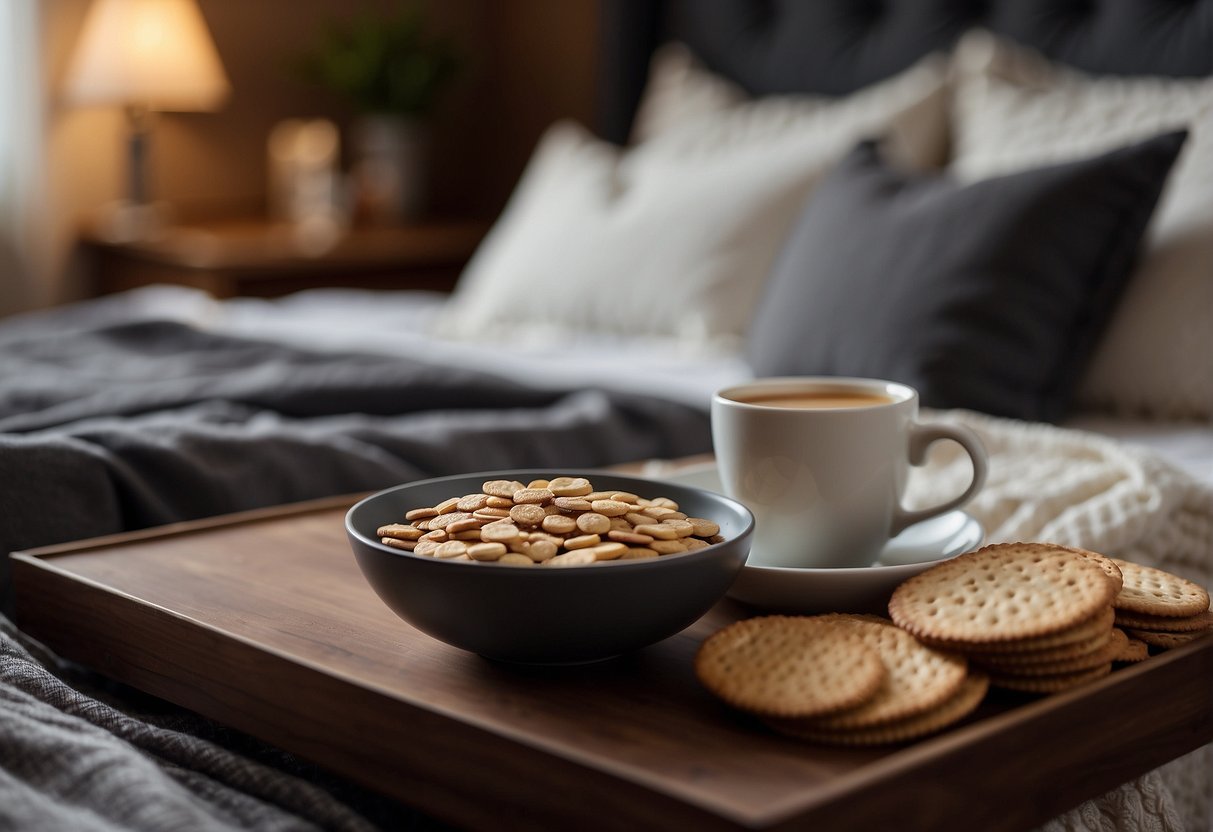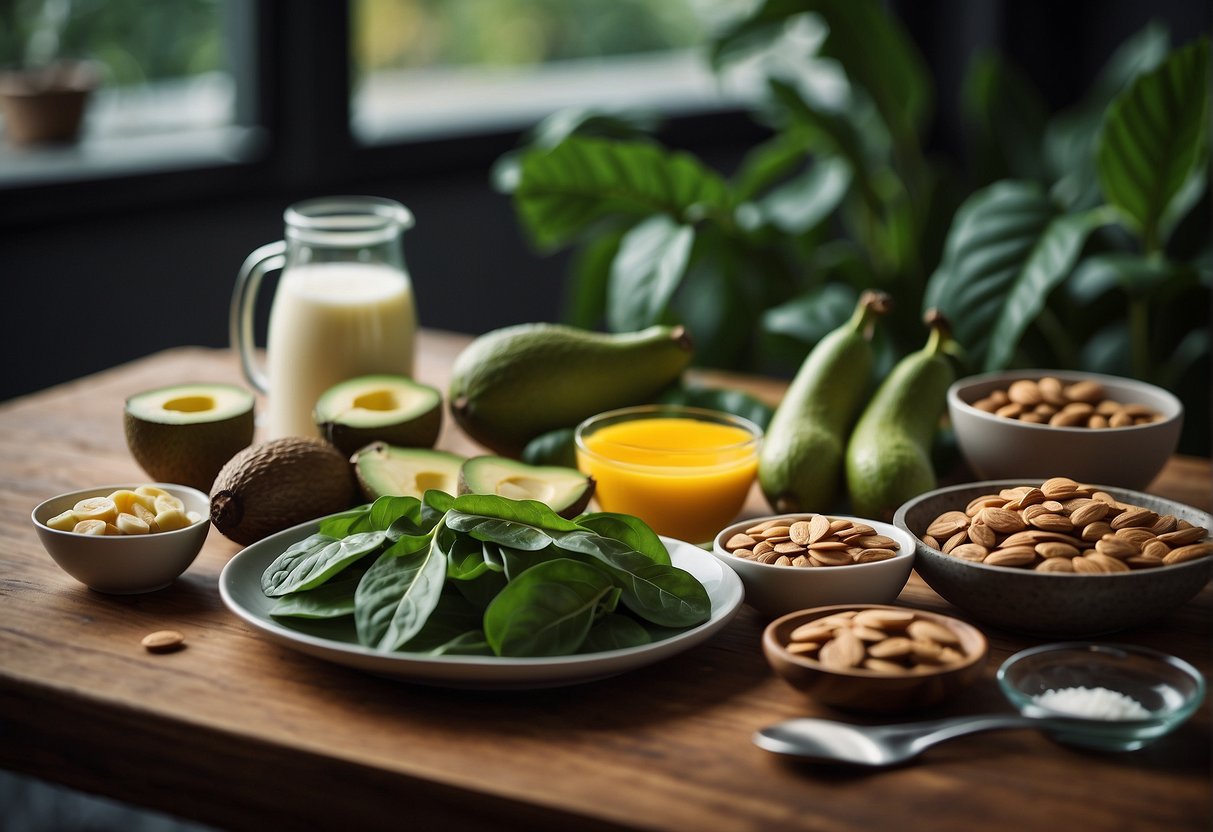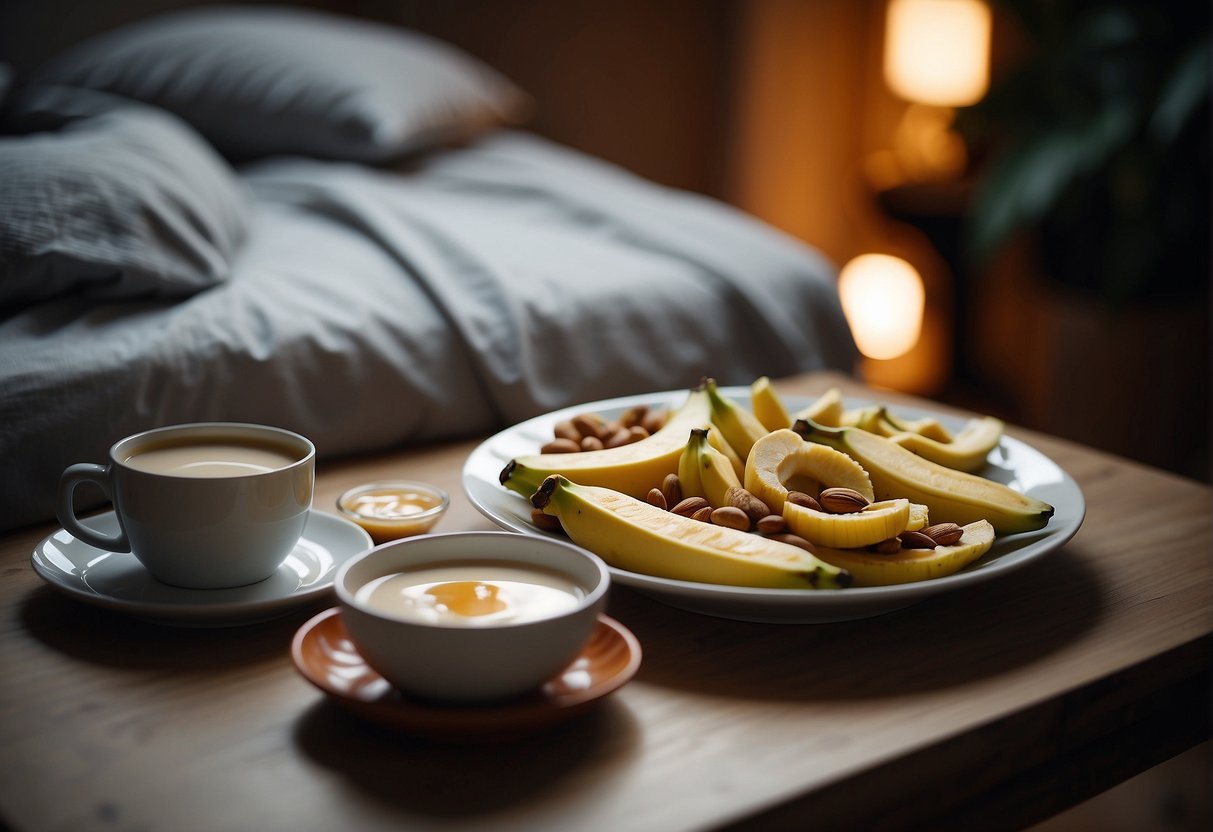Foods That Help You Stay Asleep: Unlocking the Secrets to a Restful Night
Getting a good night’s sleep is essential for maintaining overall health and well-being. However, many people struggle to not only fall asleep but also stay asleep throughout the night. Diet plays a crucial role in the quality of sleep one experiences, and certain foods have been found to help promote a restful night’s sleep.

Some foods contain essential nutrients that support relaxation and deep sleep, allowing the body to recover from the day’s activities. Incorporating these sleep-promoting foods into your daily diet might be the solution for those who find themselves tossing and turning at night, unable to stay asleep for extended periods.
Key Takeaways
- Magnesium-rich foods can contribute to relaxation and restful sleep.
- Foods containing tryptophan may help increase the production of sleep-promoting hormones.
- A balanced diet with specific carbohydrate-protein pairings and herbal remedies may support better sleep quality.
Foods High in Magnesium

Bananas
Bananas are a popular and convenient snack known for their potassium content. However, they are also a good source of magnesium. A medium-sized banana contains about 37 mg of magnesium, which contributes to sleep quality. Magnesium is an essential mineral that helps maintain the balance of neurotransmitters, supporting deep and restful sleep.
Spinach
Spinach is not only a nutrient-dense green, but also a rich source of magnesium. One cup of cooked spinach provides about 157 mg of magnesium. In addition to its magnesium content, spinach is packed with other essential nutrients that can support overall health. Incorporating spinach into your diet may help improve your sleep quality, especially if you are facing difficulty staying asleep.
Pumpkin Seeds
Pumpkin seeds may be small, but they are mighty when it comes to their magnesium content. Just one ounce of pumpkin seeds contains about 156 mg of magnesium, making them one of the top food sources of this essential mineral. The high levels of magnesium found in pumpkin seeds can promote relaxation and improve sleep quality. Try adding a handful of pumpkin seeds to your daily routine to help you stay asleep and wake up feeling refreshed.
Tryptophan-Rich Foods

Turkey
Turkey is a popular choice when it comes to consuming tryptophan-rich foods, as it contains a significant amount of tryptophan. This essential amino acid helps in the production of serotonin, a neurotransmitter that regulates our sleep cycle. So, it’s plausible to attribute that satisfying post-holiday meal drowsiness in part to the tryptophan found in turkey meat.
Cheese
Cheese, especially varieties like cheddar, mozzarella, and Swiss, contain high levels of tryptophan too. As a versatile and tasty option, incorporating cheese into your meals could help improve sleep quality. However, it’s important to consume cheese in moderation, as it can also be high in fat and calories.
Eggs
Eggs are another great source of tryptophan, specifically the egg protein hydrolysate found in egg-based products. Studies have shown that consuming tryptophan-rich egg protein can even benefit infants aged 8 to 16 months with sleep issues.
Incorporating these tryptophan-rich foods into your diet can contribute to better sleep quality. Just remember to keep consumption in moderation and enjoy a balanced diet for optimal sleep and overall wellness.
Carbohydrate and Protein Pairings
Whole Grain Bread with Nut Butter
I recommend whole grain bread topped with nut butter as a bedtime snack. Whole grain bread is rich in complex carbohydrates, which provide a slow and steady release of energy. Nut butters, such as peanut or almond, contain protein and healthy fats, which can promote feelings of satiety and support muscle repair during sleep. Combine these two for a well-balanced, sleep-inducing snack.
- Ingredients: 1 slice of whole grain bread, 1-2 tablespoons of nut butter
- Preparation: Simply spread the nut butter on the bread. Optionally, add banana slices for extra fiber and potassium.
Cottage Cheese with Fruits
Cottage cheese is an excellent source of slow-digesting casein protein, which supplies a gradual release of amino acids to support muscle recovery during sleep. Pairing cottage cheese with fruits, such as berries or kiwi, provides natural sugars and antioxidants for overall health. This combination can help you feel satisfied and sleep better.
- Ingredients: 1/2 cup of cottage cheese, 1/2 cup of fresh fruit (berries, kiwi, or cherries)
- Preparation: Mix the fruit into the cottage cheese and enjoy.
Oatmeal with Almonds
Oatmeal is a comforting, high-fiber carbohydrate known for inducing sleepiness. Topping oatmeal with almonds adds protein and healthy fats to keep you full and satisfied throughout the night. Almonds also contain magnesium, which can improve sleep quality, especially in those with insomnia.
- Ingredients: 1/2 cup of oats, 1 cup of water or milk, a handful of almonds
- Preparation: Cook the oatmeal according to package instructions. Top with almonds and a light drizzle of honey, if desired.
Herbal Remedies and Teas
Chamomile Tea
I often recommend chamomile tea for those struggling to stay asleep. It’s well-known for its calming properties, helping to soothe the nerves and promote relaxation. The active compound, apigenin, binds to receptors in the brain, which can reduce anxiety and initiate sleep (source).
Tip: Drink a cup of chamomile tea an hour before bedtime to help induce sleep.
Valerian Root
Another effective herbal remedy for sleep is valerian root. It has been used for centuries as a natural sedative and is believed to improve sleep quality and duration. Some studies show that it helps to reduce the time it takes to fall asleep and can enhance the overall quality of sleep (source).
How to use: Consume valerian root as a tea or supplement 30 minutes to an hour before bedtime.
Lavender
Lavender is widely known for its relaxing and sleep-promoting properties. Its aromatic scent can help alleviate anxiety, stress, and even mild insomnia. Studies suggest that lavender can improve the quality of sleep, particularly for those dealing with sleep disturbances (source).
Options: Use lavender essential oil in a diffuser, add a few drops to a warm bath, or drink lavender tea before bed.
Incorporating chamomile tea, valerian root, and lavender into your bedtime routine can help you stay asleep and improve your overall sleep quality. Experiment with these herbal remedies and teas to discover which one works best for your unique needs.
Healthy Fats for Sleep
Avocado
Avocados are a fantastic source of healthy monounsaturated fats, making them ideal for promoting a good night’s rest. These creamy fruits have been linked to better sleep quality due to their magnesium content and healthy fats. A single avocado also provides ample dietary fiber, which may help prevent late-night hunger and support stable blood sugar levels throughout the night.
Nuts
Nuts are another food group that can contribute to improved sleep. Almonds, walnuts, and cashews are particularly rich in healthy fats, magnesium, and tryptophan, an essential amino acid that helps the body produce melatonin- a hormone responsible for regulating sleep. A small handful, around 28 grams or 1 ounce, of these sleep-friendly nuts can make a satisfying late-night snack while aiding in relaxation and sleep.
- Almonds: Rich in magnesium and tryptophan
- Walnuts: High in omega-3 fatty acids, which have been linked to better sleep
- Cashews: Good source of magnesium and tryptophan
Olives
Olives, whether green or black, are a tasty source of healthy monounsaturated fats and polyphenols. These nutritious compounds have been associated with better sleep patterns in individuals who consume them regularly. Consuming a moderate portion of olives as part of your evening meal or as a snack may help to enhance sleep quality by promoting relaxation and reducing inflammation. Moreover, olives are a good source of vitamin E which further supports a healthy sleep.